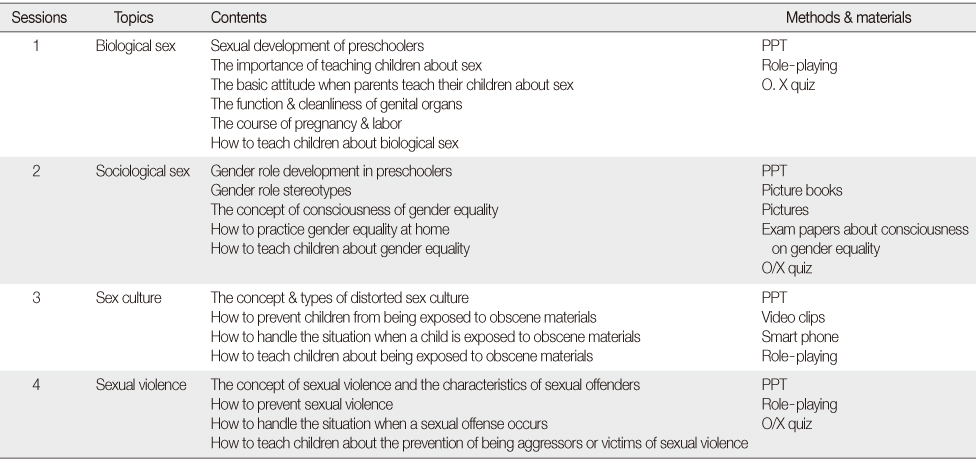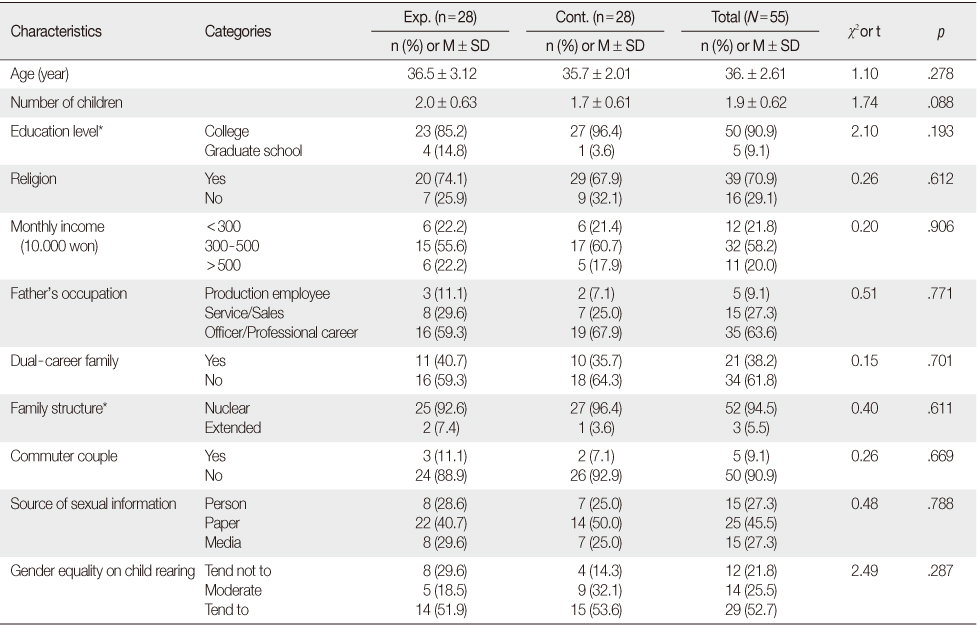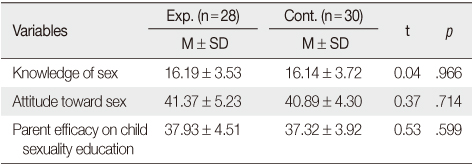Articles
- Page Path
- HOME > J Korean Acad Nurs > Volume 43(3); 2013 > Article
-
Original Article
- Effects of a Maternal Sexuality Education Program for Mothers of Preschoolers
- Eun Mi Lee, Young-Ran Kweon
-
Journal of Korean Academy of Nursing 2013;43(3):370-378.
DOI: https://doi.org/10.4040/jkan.2013.43.3.370
Published online: June 28, 2013
1Department of Nursing, Graduate School of Chosun University, Gwangju, Korea.
2Department of Nursing, Chosun University, Gwangju, Korea.
- Address reprint requests to: Kweon, Young-Ran. Department of Nursing, Chosun University, 375 Seosuk-dong, Dong-gu, Gwangju 501-759, Korea. Tel: +82-62-230-6325, Fax: +82-62-230-6329, yrk@chosun.ac.kr
• Received: February 22, 2013 • Accepted: March 27, 2013
© 2013 Korean Society of Nursing Science
Abstract
-
Purpose
- The purpose of this study was to evaluate effects of a maternal sexuality education program for mothers of preschoolers.
-
Methods
- A quasi-experimental with non-equivalent control group pretest-posttest design was conducted. The participants were 55 mothers of preschoolers in G city (Experimental group=27, Control group=28). The experimental group received the maternal sexuality education, and the control group received the program after the experiment. Data were collected during October and November 2012 through self-administered questionnaires at two times: prior to the intervention and after the intervention. Data were analyzed using χ2-test, Fisher's exact test and t-test.
-
Results
- After the intervention, mothers in the experimental group reported significant differences in knowledge of sex (t=3.74, p<.001), attitude toward sex (t=4.31, p<.001), parent-efficacy on child sexuality education (t=11.96, p<.001). compared to mothers in the control group.
-
Conclusion
- These results indicate that a sexuality education program for mothers of preschoolers is effective in improving knowledge of sex, attitude toward sex, and parent-efficacy on child sexuality education. Therefore further study should be done with larger and varied participants to confirm the effects of sexuality education programs for mothers of preschoolers.
- 1. Choi MS, Ha NS. A study on knowledge, attitude, and experience in sex and sexual autonomy of college students. Korean J Women Health Nurs. 2004;10(4):318–330.ArticlePDF
- 2. Christopher K, Lutz-Zois CJ, Reinhardt AR. Female sexual-offenders: Personality pathology as a mediator of the relationship between childhood sexual abuse history and sexual abuse perpetration against others. Child Abuse Negl. 2007;31(8):871–883. http://dx.doi.org/10.1016/j.chiabu.2007.02.006ArticlePubMed
- 3. Crosby RA, Hanson A, Rager K. The protective value of parental sex education: A clinic-based exploratory study of adolescent females. J Pediatr Adolesc Gynecol. 2009;22(3):189–192. http://dx.doi.org/10.1016/j.jpag.2008.08.006ArticlePubMed
- 4. Eastman KL, Corona R, Schuster MA. Talking parents, healthy teens: A worksite-based program for parents to promote adolescent sexual health. Prev Chronic Dis. 2006;3(4):A126. PubMedPMC
- 5. Eum JS. Effects of a parent-involvement sex education program for high primary-school graders. J Korea Community Health Nurs Acad Soc. 2004;18(1):143–153.
- 6. Guem SH, Kim MH, Kang IS. Research on sex education of young children's mothers. Korean Parent Child Health J. 2005;8(1):49–63.
- 7. Jin HS, Park HR. Sexual knowledge and perception and current status of sex education among parents of first and second grade elementary schoolers. J Korean Acad Child Health Nurs. 2011;17(3):198–205. http://dx.doi.org/10.4094/jkachn.2011.17.3.198Article
- 8. Kaljee LM, Tho LH, Minh TT, Lerdboon P, Green M, Riel R, et al. A sexual health program for Vietnamese parents of adolescents: A preliminary report on changes in parental knowledge, communication, and self-efficacy for condom use. J Assoc Nurses AIDS Care. 2012;23(6):555–560. http://dx.doi.org/10.1016/j.jana.2011.11.003ArticlePubMed
- 9. Khurana A, Cooksey EC. Examining the effect of maternal sexual communication and adolescents' perceptions of maternal disapproval on adolescent risky sexual involvement. J Adolesc Health. 2012;51(6):557–565. http://dx.doi.org/10.1016/j.jadohealth.2012.03.007ArticlePubMed
- 10. Kim EH, Park JO, Lee HA. A study on disclosure of child sexual abuse. Korean J Vict. 2011;19(1):131–154.
- 11. Kim ES, Kim GJ, Kim BH. Analysis of correlation between contacts to cyber obscene materials and sex crime of high school students. J Korea Contents Assoc. 2011;11(6):8–17. http://dx.doi.org/10.5392/JKCA.2011.11.6.008Article
- 12. Kim GJ. Preschool infant sexual assault: Experiences at sexual assault clinic. Korean J Obstet Gynecol. 2007;50(1):173–179.
- 13. Kim K, Kim SJ. Needs on early childhood sex education of teachers in day care centers for children. J Korean Acad Child Health Nurs. 2010;16(2):93–101. http://dx.doi.org/10.4094/jkachn.2010.16.2.93Article
- 14. Kim YS. Effecct of parents sex education program to elementary school students in higher grade. Seoul, Korea University. 2008;Unpublished master's thesis.
- 15. Klein JD, Sabaratnam P, Pazos B, Auerbach MM, Havens CG, Brach MJ. Evaluation of the parents as primary sexuality educators program. J Adolesc Health. 2005;37:3 Suppl. S94–S99. http://dx.doi.org/10.1016/j.jadohealth.2005.05.004ArticlePubMed
- 16. Ku SA. A parental sexuality education for early childhood. 2009;Retrieved September 10, 2012. from http://www.aoosung.com/edu/movie_detail.php?goodsIdx=457
- 17. Lee BR. A survey on the mothers' understanding or attitude of sex education for young children. J Korea Open Assoc Early Child Educ. 2001;6(1):67–87.
- 18. Lee IS, Kim HS, Cho JY. Viewing internet obscenity and sexuality awareness of elementary school students. J Korean Soc Sch Health. 2007;20(2):35–46.
- 19. Liavshina GKh. Parents' participation in sex education of children. Probl Sotsialnoi Gig Zdravookhranenniiai Istor Med. 2002;3:22–24.
- 20. Ministry of Education Science and Technology. Early childhood sex education program. 2006;Retrieved September 10, 2012. from http://www.mest.go.kr/web/1121/ko/board/view.do?bbsId=159&boardSeq=8027
- 21. Ministry of Gender Equality and Family. Safety indicators system building and development of women and children. 2009;Retrieved June 10, 2012. from http://www.mogef.go.kr/korea/view/news/news03_01.jsp?func=view&idx=223220
- 22. Park SR. The effecct analysis of parents sex education program to puberty. Busan, Dongeui University. 2009;Unpublished master's thesis.
- 23. Schuster MA, Corona R, Elliott MN, Kanouse DE, Eastman KL, Zhou AJ, et al. Evaluation of talking parents, healthy teens, a new worksite based parenting programme to promote parent-adolescent communication about sexual health: Randomised controlled trial. BMJ. 2008;337:a308. http://dx.doi.org/10.1136/bmj.39609.657581.25ArticlePubMedPMC
- 24. Shin GS. A qualitative study on the psychological and social characteristics of juvenile sexual offenders. Paper presented at the 2009 Annual Convention Program. Seoul, Korean Psychological Association; 2009. 08.
- 25. Sulak PJ, Herbelin SJ, Fix DD, Kuehl TJ. Impact of an adolescent sex education program that was implemented by an academic medical center. Am J Obstet Gynecol. 2006;195(1):78–84. http://dx.doi.org/10.1016/j.ajog.2005.12.011ArticlePubMed
- 26. The Korea Sexual Violence Relief Center. 2011 Korea Sexual Violence Relief Center counseling statistics and counseling trend analysis. 2011;Retrieved June 10, 2012. from http://www.sisters.or.kr/index.php/subpage/pds/1
- 27. Wakley G. Helping parents with sex education. J Fam Health Care. 2011;21(2):30–33.
- 28. Woo MJ. The construction and effects of a sex education program for young children. Early Child Educ Res Rev. 2011;15(2):33–56.
- 29. Yang SO, Kim SJ. Development of an evaluation tool for middle school student sex education. Korean J Child Health Nurs. 2004;10(3):332–339.
- 30. Yeo KA, Lee HZ, Kim MH, Park HS, Eo YS. A study on the relationship between mothers' conception on gender egalitarianism and children's attitude toward gender roles. J Korean Acad Soc Nurs Educ. 2004;10(1):105–114.
REFERENCES
Figure & Data
REFERENCES
Citations
Citations to this article as recorded by 

- The development and effects of an online parent sexuality education programme for preschool children in Türkiye
Sıla Uzkul, Ayşe Dilek Öğretir Özçelik
Sex Education.2026; 26(2): 249. CrossRef - Japanese Mothers’ Communication on Sexuality Education with Elementary School-Age Children (7–11)
Takahiro Sato, Chie Kataoka, Tomomi Mitsutake, Cathy McKay, Hirotaka Kizuka, Manami Koide, Miho Miyachi, Takafumi Tomura, Yu Furuta
Sage Open.2025;[Epub] CrossRef - The mediating role of sexual abuse education on Parents’ knowledge and attitudes towards child sexual abuse in Turkey
Abdullah Sarman, Suat Tuncay
Children and Youth Services Review.2025; 169: 108084. CrossRef - Parents’ Knowledge of Sexuality Education for Young Children: A Scoping Review of Studies in Asian Countries
Yumo Ding, Kamariah Abu Bakar, Nurul Khairani Ismail
European Journal of Educational Research.2025; 14(4): 1151. CrossRef - Laypeople’s Perceptions of Sexuality Education with Young Children Insights from a Convenient Sample of the Greek Orthodox Community
Iraklis Grigoropoulos
American Journal of Sexuality Education.2024; 19(3): 316. CrossRef - Ebeveynlerin Cinsel Bilgi Düzeyi, Tutum, Cinsel İletişim ve Cinsel İstismar Farkındalığını Etkileyen Etmenler
Sıla Uzkul, Ayşe Dilek Öğretir Özçelik
Sinop Üniversitesi Sosyal Bilimler Dergisi.2024; 8(1): 507. CrossRef - AFFECTIVE-SEXUAL EDUCATION AS A CROSSROAD IN THE RELATIONSHIP WITH FAMILY AND SCHOOL
Moisés Mañas Olmo, Blas González Alba, Pablo Cortés González
Cadernos de Pesquisa.2023;[Epub] CrossRef - LA EDUCACIÓN AFECTIVO-SEXUAL COMO ENCRUCIJADA EN LA RELACIÓN FAMILIAS Y ESCUELA
Moisés Mañas Olmo, Blas González Alba, Pablo Cortés González
Cadernos de Pesquisa.2023;[Epub] CrossRef - A study on the reliability and validity of the Korean version of the parenting outcome expectancy scale for parents of elementary school students
Yoonjung Kim, Jungmin Lee, Ratchneewan Ross
Frontiers in Psychology.2023;[Epub] CrossRef - Knowledge, attitudes, and practices of parents toward sexuality education for primary school children in China
Wenjing Zhang, Yuzhi Yuan
Frontiers in Psychology.2023;[Epub] CrossRef - Knowledge and attitude and practice of parents in response to their children's sexual behavior
Jila Ganji, Effat Merghati-Khoei, Raziyeh Maasoumi, Afsanah Keramat, MohammadHassan Emamian
Journal of Nursing and Midwifery Sciences.2022; 9(1): 45. CrossRef - The Effect of an Education Program on Iranian Mothers’ Self-efficacy in Child Sex Education: a Randomized Controlled Clinical Trial
Somayeh Soleimani, Raziyeh Maasoumi, Shima Haghani, Samira Noorzaie
Sexuality Research and Social Policy.2022; 19(4): 1819. CrossRef - The Effect of Children’s Sexual Health Education Program on Knowledge and Attitude of Primary School Health Care Providers
Zahra Barimani Aboksari, Jila Ganji, Nouraddin Mousavinasab, Soghra Khani
Journal of Child Sexual Abuse.2021; 30(5): 563. CrossRef - Indirect Sexuality Education to Adolescent Girls Through Empowering Their Mothers
Masoumeh Majdpour, Mohsen Shams, Saadat Parhizkar, Ali Mousavizadeh, Zahra Rahimi, Mostafa Maleki, Sedigheh Shariatinia
International Journal of High Risk Behaviors and Addiction.2021;[Epub] CrossRef - A sex education program for teachers of preschool children: a quasi-experimental study in Iran
Jeno Martin, Hedyeh Riazi, Armin Firoozi, Maliheh Nasiri
BMC Public Health.2020;[Epub] CrossRef - Effectiveness of a Group Educational Program on the Knowledge, Attitude, and Participation Approach of Mothers in the Sex Education of Preschool Children
H Fatehi Pouladi, M Akbari Kamrani, M Javad Noori, M Farid
Iran Journal of Nursing.2019; 32(119): 12. CrossRef - Development of a Sexual Abuse Prevention Education Program for Elementary School Students Using a Hybrid Application
Shin-Jeong Kim, So-Ra Kang, Jung Min Lee
Child Health Nursing Research.2018; 24(1): 109. CrossRef - A sex education programme for mothers in Iran: Does preschool children’s sex education influence mothers’ knowledge and attitudes?
Jeno Martin, Hedyeh Riazi, Armin Firoozi, Maliheh Nasiri
Sex Education.2018; 18(2): 219. CrossRef - Development and Effects of a Children's Sex Education Program for the Parents of Lower Elementary Grade Students
Eun Mi Lee, Hyunlye Kim
Journal of Korean Academy of Nursing.2017; 47(2): 222. CrossRef - Knowledge and Attitude of Mothers toward Preschool Sexual Education
K Mobredi, SB Hasanpoor Azgahdy, L Amiri Farahani
Iran Journal of Nursing.2017; 30(106): 35. CrossRef - Mothers’ views about sexual health education for their adolescent daughters: a qualitative study
Mohsen Shams, Sa’adat Parhizkar, Ali Mousavizadeh, Masoumeh Majdpour
Reproductive Health.2017;[Epub] CrossRef - Sexual Knowledge and Sexual Attitude and Parent Efficacy among Parents of Preschool Child
Eun Mi Lee, Yun Jeong Oh
Journal of the Korea Convergence Society.2016; 7(6): 141. CrossRef
Effects of a Maternal Sexuality Education Program for Mothers of Preschoolers
Effects of a Maternal Sexuality Education Program for Mothers of Preschoolers
Contents of a Sexuality Education Program
Homogeneity of General Characteristics
Exp.=Experimental group; Cont.=Control group.
*Fisher's exact test.
Homogeneity of Dependent Variables
Exp.=Experimental group; Cont.=Control group.
Comparison of Dependent Variables among Two Groups after Treatment
Exp.=Experimental group; Cont.=Control group.
Table 1
Contents of a Sexuality Education Program
Table 2
Homogeneity of General Characteristics
Exp.=Experimental group; Cont.=Control group. *Fisher's exact test.
Table 3
Homogeneity of Dependent Variables
Exp.=Experimental group; Cont.=Control group.
Table 4
Comparison of Dependent Variables among Two Groups after Treatment
Exp.=Experimental group; Cont.=Control group.
 KSNS
KSNS
 E-SUBMISSION
E-SUBMISSION




 Cite
Cite

